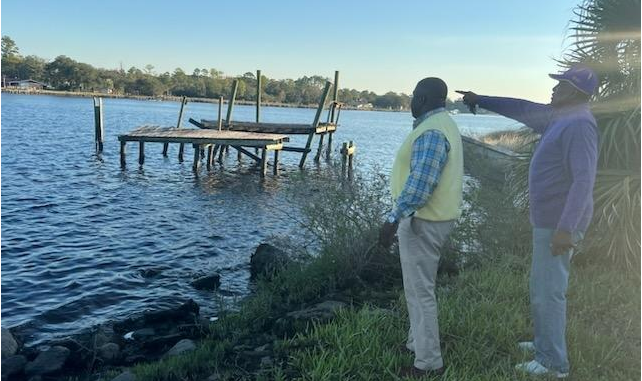
Living in Jacksonville, one is surrounded by water in one way or another. Between the St. Johns River, the Intercoastal Waterway, and the Atlantic Ocean, being connected to the water is a way of life. Many grew up going to the beach all summer and had fish, which covers seafood in general, every Friday, not just during Lent.
Much of the northside was once white working- and middle-class neighborhoods but began to transition in the late 1960s during what is widely known in America as white flight. By the 1970s and 80s the neighborhoods were almost completely considered a Black, but still middle-class neighborhoods.
Unfortunately, this area has had a history of pollution, and more recently has experienced the consequences of river dredging.
Manatees are now dying in record numbers, making the national news regularly.
But why should northside residents care?
Manatees act as the canary in the coalmine and they are dying from starvation. Submerged aquatic vegetation (SAVs) is the primary source of food for manatees, along with fish, crabs, and other important creatures in the food chain. Their inability to find food is an indicator of the overall health of the St. Johns River. The rapid increase in deaths should make one wonder what is really going on and if it is manatees now, what might be next.
Ivan Scott, a retired military officer, grew-up in the northside’s Ribault Manor neighborhood. Today, he still fishes and traps crabs along the Ribault and Trout Rivers. “I had a recent conversation with a childhood friend,” said Scott. “We used to see manatees every week. I haven’t seen one in more than a year. And crabbing and fishing have become more difficult. Maybe it’s all related.”
Many readers might have experienced flooding as recently as this past month. The fall not only brings the height of hurricane season, but also King Tide Flooding. Entire neighborhoods were trapped by water, residents were not able to leave their house for days and then had to time their comings and goings with the tides. This flooding can be linked to the destruction of wetlands and SAVs.
Some might remember the haunting images of the catastrophic flooding in the New Orleans, LA area by Hurricane Katrina. While there were a vast number of lower-income residents that were not able to evacuate, and therefore captured on television, there was also a significant number of middle-class minorities that did flee, only to have their homes destroyed by flooding. Similarly, there are many who incurred significant impacts and damage as a result of hurricanes Matthew and Irma. While the residents of the northside do not necessarily have to worry about a levee breach, faulty infrastructure and lack of policy enforcements do make this area just one storm away from historic devastation.
There are patterns of neglect and underserving, all relating back to the issue(s) of water and connecting clean water to environmental issues, particularly in minority and low-income communities.
The wetlands are a symbol of what I consider home, Florida. I love the smell of the marsh and the way that the marsh feeds and protects us. As this project evolves and continues to take shape, we will take a more in-depth look at the history of the land and culture. Over the fall next few months, we will examine various topics impacting this area that include:
· History of Pollution of the St. Johns River in Jacksonville
· Infrastructure, Pump Stations, and Septic Tanks
· The Dredging in the St. Johns River
· Rising Water Table
· What Can Be Done?
I hope you will join me on this journey as we all learn more about the Deepening Waters and Why Northside Residents Should Care About the Manatees Dying.
Karen Estella Smith completed this work as a part of her graduate work with Project Dragonfly at Miami University in Oxford, OH, in conjunction with the Jacksonville Zoo & Gardens, where she is attaining her master’s degree in biology, focusing on conservation and environmental justice.

Be the first to comment